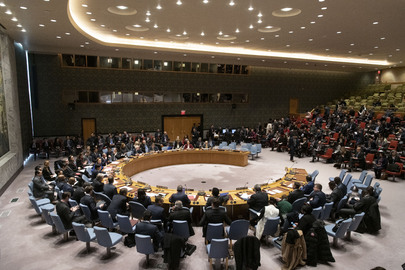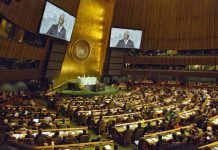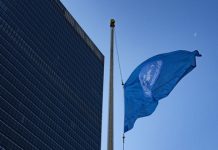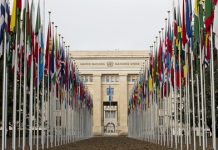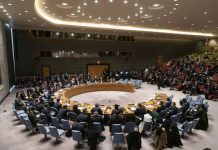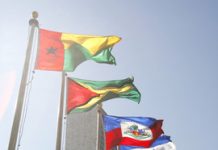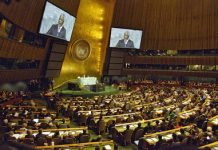Transcript UNIFIL Interview: Andrea Tenenti
UN News: Thank you, Mr. Tenenti for being with us today, and for giving us the time to speak.
First of all, can you explain to us what happened last week at the Blue Line, and with the UNIFIL troops.
Andrea Tenenti: Well, in recent weeks and in recent days the situation in UNIFIL’s area of operation in South of Lebanon has been highly concerning because a large number of shelling, bombing, exchanges of fire hostilities, but also attacks against our troops. One of them was 2 peacekeepers were injured. There was an Israeli Merkava tank that hit one of the towers inside the Naqoura headquarters. Another Israeli defense forces hit one position close to the Blue Line, and that was since close to, hitting the cameras of the position, another one the communication, and another one the illumination of the position. Then also you have drones going very close to the bunkers, where peacekeepers were sheltering.
On Sunday morning, early morning, 2 Merkava tanks, Israeli Merkava tanks, entered inside one of the positions of UNIFIL close to the Blue Line Ghanaian positions. And they entered, damaging the entrance, and they stayed there for almost 45 min. So, the situation is definitely concerning, especially after the Israeli defense forces told us to move from some of the positions close to the Blue Line. We are staying, it’s important that it was a decision taken because we are in the South of Lebanon under a Security Council mandate. So, it’s important to keep an international presence and to keep the UN Flag in the area.
UN News: How crucial is the role of UNIFIL now? And why is it important for peacekeepers, as you say, to remain in all positions?
Andrea Tenenti: The role of UNIFIL, maybe at the moment, is even more crucial than ever because of the dangerous developments, because of the increasing tension, because of the ongoing shelling, because of IDF entering inside Lebanese territories. So, it’s very crucial for UNIFIL to be in the South, to be able to monitor and report to the Security Council.
And understandably, at the moment our monitoring capabilities have been limited because of the ongoing shelling and bombing in the area but we are still monitoring the situation. We are still capable of keeping some limited monitoring of the Arab operations.
But the most important part is to be able to assist and provide assistance to local communities and people that are stuck in villages in the South of Lebanon, and in need of water and food. Thousands of people have left the South of Lebanon, but there’s still a lot of people that need the most basic supplies.
UN News: Speaking about the people staying in the South. We have seen the destruction, and we have seen a lot of civilians refusing to evacuate the villages. How are you dealing with these situations?
Andrea Tenenti: Well, more than 350,000 people left the South of Lebanon, but some people cannot leave because they don’t have a place to go. They don’t have other areas where they can go to. People want to stay in their villages, and what’s relevant right now is to ensure that they are provided with the most basic needs.
The problem right now is that we have been trying to deconflict these activities and provide assistance together, of course in coordination with UN agencies, Red Cross. But most of the times, these activities could not take place because of the heavy shelling, but also because we were not getting reassurances from the parties that we could actually move to all these locations. So very concerning. And it’s important for everyone to understand that we need to protect civilians, and we need to provide assistance to the people left in South Lebanon.
UN News: Can the UNIFIL still fulfill its mandate with all that is happening in the South, like blocking logistical movement, denying passage, breaching, and entering positions. As you mentioned
Andrea Tenenti: We’re still doing part of our job, and the presence in the South is the most relevant one because we need to be there, we need to have an impartial force in South Lebanon that can still report to the Security Council. What we do not have at the moment is the capabilities at the time to provide assistance to local communities.
But what is needed now is a political and diplomatic solution to this conflict. It’s important for Member States, for main stakeholders to step in and find viable solutions to this conflict, because, as I said, the military solutions that we’re seeing right now is not the solution. The only solution is the political and diplomatic.
UN News: We heard on the news Israeli Prime Minister saying in a statement addressed to UN Secretary-General, “The time has come for you to withdraw UNIFIL from Hezbollah strongholds and from the combat zones.” What is your comment on this?
Andrea Tenenti: The Secretary-General was very firm and vocal, as we have been a few days ago, when we were asked to move positions close to the Blue Line. We decided to stay, it’s our role. We have been mandated by the Security Council. We are there at the request also of the Lebanese authorities. One Member States cannot ask the international community to move from an area that has been mandated by the Security Council. So, it’s important to stay. It’s important to do whatever we can at the moment to provide assistance and to monitor.
UN News: Okay. So last question, do you consider what’s happening a grave violation of international humanitarian law and resolution 1701?
Andrea Tenenti: What happened in recent days with the attacks that we have been suffering from the Israeli defense forces. There have been some deliberate attacks against our troops, and peacekeepers were injured. So, this is not only a violation of resolution 1701, it’s also a serious violation of international humanitarian law, and the parties have the obligation to protect peacekeepers and ensure the safety and security of our troops.
UN News: Did you receive any reply from IDF concerning the last violation? Did you have any contact with them, any reply from their part?
Andrea Tenenti: The communication channel is still open, so we still are in constant touch and communication with the Israeli defense forces. This has not stopped. I understand that they’re carrying out an investigation on what happened, but I think it’s very clear that when you hit a tower inside a UNIFIL headquarters, which is a visible tower, or you hit the cameras of one of our positions or the communications, or the illumination, or you enter with drones close to a Bunker is definitely concerning because we see it as a deliberate attack against our troops.
Source of original article: United Nations (news.un.org). Photo credit: UN. The content of this article does not necessarily reflect the views or opinion of Global Diaspora News (www.globaldiasporanews.com).
To submit your press release: (https://www.globaldiasporanews.com/pr).
To advertise on Global Diaspora News: (www.globaldiasporanews.com/ads).
Sign up to Global Diaspora News newsletter (https://www.globaldiasporanews.com/newsletter/) to start receiving updates and opportunities directly in your email inbox for free.


